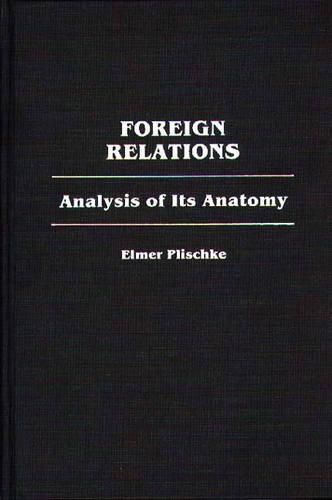
Foreign Relations: Analysis of Its Anatomy
(Hardback)
Publishing Details
Foreign Relations: Analysis of Its Anatomy
By (Author) Elmer Plischke
Bloomsbury Publishing PLC
Praeger Publishers Inc
26th September 1988
United States
Classifications
Tertiary Education
Non Fiction
327.73
Physical Properties
Hardback
328
Description
The realists' concern for power in the global perspective is evident and persuasive throughout as Plischke chooses to focus on concepts such as national interests; vital interests; and national purposes, goals, and policy perspectives. The author also looks at national planning and strategy and at the general concept of decision making in foreign policy. A must for graduate students in international relations and therefore for the libraries that support them. Choice This volume provides a broad survey of ideas, literature, and national practice concerning the principal constituents of foreign relations. Much has been written concerning the elements of foreign policy but little has been done to define their meanings and to meld them into an integrated volume. This study is based on a broad survey of English-language commentary on foreign affairs, and on the development of American concepts, interpretations, and commentary. The treatment is historic, explanatory, and systematic. The object is to progress from perceptions and ideas to usable terminology and concrete meanings. The overall goal is to distill from these commonly used concepts their essential and universal meanings.
Reviews
"Plischke's Table of Contents is in effect an enumeration of the central questions in the discipline: national interest, vital interests, national power, national purposes, national goals and policy objectives and national planning and strategies. His discussion provides reading material alike for an introduction to such subjects and for advanced graduate seminars. . . . In sum, Plischke supplies intellectual resources that have been absent before the publication of his work."-Kenneth W. Thompson, Director, The White Burke Miller Center of Public Affairs, University of Virginia
[Plischke's] Table of Contents is in effect an enumeration of the central questions in the discipline: national interest, vital interests, national power, national purposes, national goals and policy objectives and national planning and strategies. His discussion provides reading material alike for an introduction to such subjects and for advanced graduate seminars. . . . In sum, Plischke supplies intellectual resources that have been absent before the publication of his work.-Kenneth W. Thompson, Director, The White Burke Miller Center of Public Affairs, University of Virginia
James E. Dougherty and Robert L. Paltzgraff Jr., the leaders in the field of international studies, provide students with a compendium of the literature by focusing on theories and hypotheses in Contending Theories of International Relations. Plischke, noted for years for his work on diplomacy, approaches the field from a different perspective; he addresses the question: "Who is writing what about a set of topics or themes" Thus, in his survey of specialist interpretations of contemporary international political phenomena he seeks to meet a "need for clarity in understanding the meaning of fundamental concepts." The realists' concern for power in the global perspective is evident and persuasive throughout as Plischke chooses to focus on concepts such as national interests; vital interests; and national purposes, goals, and policy perspectives. The author also looks at national planning and strategy and at the general concept of decision making in foreign policy. A must for graduate students in international relations and therefore for the libraries that cater to them.-Choice
"Plischke's Table of Contents is in effect an enumeration of the central questions in the discipline: national interest, vital interests, national power, national purposes, national goals and policy objectives and national planning and strategies. His discussion provides reading material alike for an introduction to such subjects and for advanced graduate seminars. . . . In sum, Plischke supplies intellectual resources that have been absent before the publication of his work."-Kenneth W. Thompson, Director, The White Burke Miller Center of Public Affairs, University of Virginia
"[Plischke's] Table of Contents is in effect an enumeration of the central questions in the discipline: national interest, vital interests, national power, national purposes, national goals and policy objectives and national planning and strategies. His discussion provides reading material alike for an introduction to such subjects and for advanced graduate seminars. . . . In sum, Plischke supplies intellectual resources that have been absent before the publication of his work."-Kenneth W. Thompson, Director, The White Burke Miller Center of Public Affairs, University of Virginia
"James E. Dougherty and Robert L. Paltzgraff Jr., the leaders in the field of international studies, provide students with a compendium of the literature by focusing on theories and hypotheses in Contending Theories of International Relations. Plischke, noted for years for his work on diplomacy, approaches the field from a different perspective; he addresses the question: "Who is writing what about a set of topics or themes" Thus, in his survey of specialist interpretations of contemporary international political phenomena he seeks to meet a "need for clarity in understanding the meaning of fundamental concepts." The realists' concern for power in the global perspective is evident and persuasive throughout as Plischke chooses to focus on concepts such as national interests; vital interests; and national purposes, goals, and policy perspectives. The author also looks at national planning and strategy and at the general concept of decision making in foreign policy. A must for graduate students in international relations and therefore for the libraries that cater to them."-Choice
Author Bio
ELMER PLISCHKE is Professor Emeritus at the University of Maryland and an Adjunct Scholar at the American Enterprise Institute.
